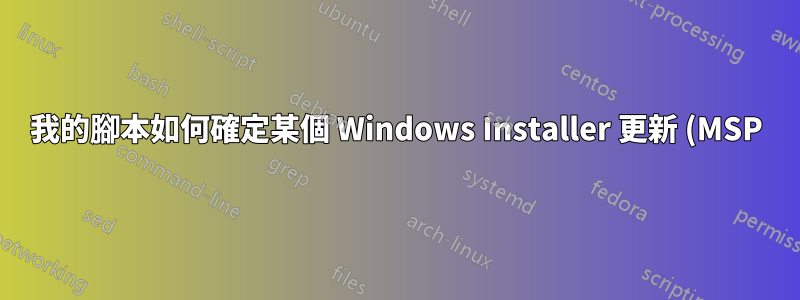%20%E7%9A%84%E5%AE%89%E8%A3%9D%E6%98%AF%E6%88%90%E5%8A%9F%E9%82%84%E6%98%AF%E5%A4%B1%E6%95%97%EF%BC%9F.png)
我編寫了一個 PowerShell 腳本(見下文)來逐一安裝大量 MSP 更新(帶有.msp擴展名的文件,透過 Windows Installer 部署)。現在,我希望此腳本也能在 MSP 更新安裝失敗時告訴我。
我嘗試過的事情:查詢錯誤代碼。有兩種方法:
- 一種是直接運作後使用$LASTEXITCODE取得錯誤碼
MSIEXEC.EXE。這很乏味。 另一個涉及添加
-PassThruswitch 到Start-Process,將其結果儲存到一個物件中,例如$a使用 讀取錯誤代碼$a.ExitCode。像這樣:$a=Start-Process msiexec.exe -ArgumentList "/p `"$MspRelPath`" /log `"$LogRelPath`" /passive /norestart" -Wait -PassThru Write-Host $a.ExitCode
兩者都沒有被證明有用。它似乎msiexec.exe總是返回零作為退出代碼。
如果有人有興趣,這裡是腳本:
param (
[parameter(mandatory=$false)][Switch]$BypassAdminPrompt
)
Try
{
Clear-Host
# Get script name
$ScriptFileObject=(Get-Item $PSCommandPath)
$ScriptName=$ScriptFileObject.Name
$ScriptPath=$ScriptFileObject.DirectoryName
# Load Windows Forms and initialize visual styles
[void][System.Reflection.Assembly]::LoadWithPartialName("System.Windows.Forms")
[System.Windows.Forms.Application]::EnableVisualStyles()
# Is the script holding administrative privileges?
$wid=[System.Security.Principal.WindowsIdentity]::GetCurrent()
$prp=new-object System.Security.Principal.WindowsPrincipal($wid)
$adm=[System.Security.Principal.WindowsBuiltInRole]::Administrator
$IsAdmin=$prp.IsInRole($adm)
if ($IsAdmin -eq $false) {
if (!$BypassAdminPrompt) {
Start-Process powershell.exe -ArgumentList "-ExecutionPolicy $env:PSExecutionPolicyPreference -File `"$PSCommandPath`" -BypassAdminPrompt" -Verb RunAs
} else {
$result=[System.Windows.Forms.MessageBox]::Show("This script requires administrative privileges, which are absent.", $ScriptName, "OK", "Error");
}
break;
}
# Install...
Set-Location $ScriptPath
$MSP_list = Get-ChildItem *.msp -Recurse
if ($MSP_list -eq $null) {
$result=[System.Windows.Forms.MessageBox]::Show("Nothing found to install.`rSearch path was "+$ScriptPath, $ScriptName, "OK", "Error");
}
else
{
$MSP_list | ForEach-Object {
# Ordinarily, I'd pass the path in the form of ".\foldername\filename.msp" but Windows Installer does not accept that.
# It must be in "foldername\filename.msp" form.
$MspRelPath = $_.FullName.Substring($ScriptPath.Length+1)
$LogRelPath = $MspRelPath+".log"
Write-Host $MspRelPath
Start-Process msiexec.exe -ArgumentList "/p `"$MspRelPath`" /log `"$LogRelPath`" /passive /norestart" -Wait
}
Remove-Variable MspRelPath
Remove-Variable LogRelPath
Pause
}
Remove-Variable MSP_list
}
Catch
{
$result=[System.Windows.Forms.MessageBox]::Show("Error!`r`r"+$Error[0], $ScriptName, "OK", "Error");
break;
}
答案1
檢查 Windows 事件中的 MSIExec 事件,或在完成後取得日誌輸出內容並檢查失敗指示。
我有一個使用 MSIExec 遠端安裝 MSI 的腳本,等待 MSIExec 關閉(或進程/服務啟動)...如果在典型安裝時間後沒有任何反應,我會檢查 MSIExec 呼叫中包含的日誌路徑並檢查失敗或成功訊息


